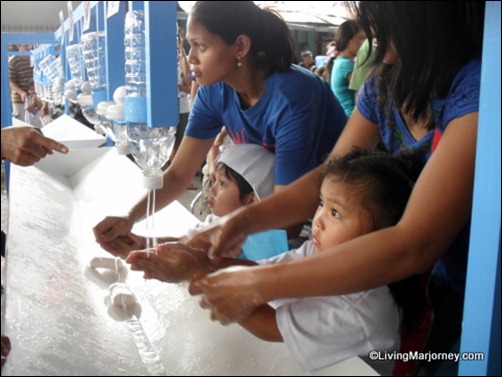Infectious diarrhea germs stick to healthcare worker hands
A new study finds nearly one in four healthcare workers’ hands were contaminated with Clostridium difficile spores after routine care of patients infected with the bacteria. The study was published in the January issue of Infection Control and Hospital Epidemiology, the journal of the Society for Healthcare Epidemiology of America.
“This is the first known study focusing on the carriage of viable C. difficile spores on healthcare workers hands,” said Caroline Landelle, PharmD, PhD, lead author of the study. “Because C. difficile spores are so resistant and persistent to disinfection, glove use is not an absolute barrier against the contamination of healthcare workers’ hands. Effective hand hygiene should be performed, even in non-outbreak settings.”
Researchers compared hand contamination rates among healthcare workers caring for patients with C. difficile with healthcare workers caring for non-colonized patients after routine patient care and before hand hygiene. All patients with C. difficile were being treated with infection control measures that consisted of (1) placing patients into a single-bed room with dedicated equipment; (2) wearing disposable gowns with full-length sleeves and a pair of gloves on entering the room; (3) hand hygiene with alcohol-based hand rub before wearing gloves, before and after body fluid exposure, and hand washing with medicated soap and water followed by use of alcohol-based hand rub after glove removal; and (4) daily room cleaning with a hypochlorite-based disinfectant.
Contamination of healthcare workers’ hands occurred with high-risk contact (e.g., patient washing, digital rectal exam, bed linen change, colonoscopy) or when workers didn’t use gloves. Hand contamination was also associated with the duration of high-risk contact and was more common among nursing assistants (42 percent) than among other healthcare workers (19 percent for nurses and 23 percent for physicians), likely because nursing assistants had more high-risk contact.
In a commentary accompanying the study, author Aurora Pop-Vicas, MD, notes that “this study offers a vivid insight into why C. difficile might be so stubbornly persistent in our hospital…much work remains to be done in implementing what is known about the prevention of the spread of this bacteria through horizontal transmission. Additional measures include improvement in antimicrobial stewardship programs and effective environmental cleaning within healthcare institutions.”
 The number of patients hospitalized with a primary C. difficile diagnosis in the United States more than tripled during 2000-2009. Key risk factors of contracting C. difficile include prior receipt of antibiotic therapy, age, severity of underlying disease, length of hospital stay and prior occupancy of patient rooms. However, many healthcare workers may be passing on this highly contagious bacteria to patients even after routine alcohol-based hand rubbing. This points to the need for routine hand washing with soap and water, rather than alcohol-based hand rub, after care of C. difficile patients in all settings.
The number of patients hospitalized with a primary C. difficile diagnosis in the United States more than tripled during 2000-2009. Key risk factors of contracting C. difficile include prior receipt of antibiotic therapy, age, severity of underlying disease, length of hospital stay and prior occupancy of patient rooms. However, many healthcare workers may be passing on this highly contagious bacteria to patients even after routine alcohol-based hand rubbing. This points to the need for routine hand washing with soap and water, rather than alcohol-based hand rub, after care of C. difficile patients in all settings.
In the Compendium of Strategies to Prevent Healthcare-Associated Infections, SHEA recommends that health professionals clean hands with soap and water after caring for patients with C. difficile infections. Evidence shows that soap and water is superior to alcohol-based sanitizers for removing C. difficile spores. SHEA plans to release an updated Compendium in 2014.
###
C. Landelle, M. Verachten, P. Legrand E. Girou, F. Barbut, C. Brun Buisson. “Contamination of Healthcare Workers’ Hands with Clostridium difficile Spores after Caring for Patients with C. difficile Infection.” Infection Control and Hospital Epidemiology 35:1 (January 2014).
Published through a partnership between the Society for Healthcare Epidemiology of America and The University of Chicago Press, Infection Control and Hospital Epidemiology provides original, peer-reviewed scientific articles for anyone involved with an infection control or epidemiology program in a hospital or healthcare facility. ICHE is ranked 13 out of 158 journals in its discipline in the latest Web of Knowledge Journal Citation Reports from Thomson Reuters.
SHEA is a professional society representing more than 2,000 physicians and other healthcare professionals around the world with expertise in healthcare epidemiology and infection prevention and control. SHEA’s mission is to prevent and control healthcare-associated infections and advance the field of healthcare epidemiology. The society leads this field by promoting science and research and providing high-quality education and training in epidemiologic methods and prevention strategies. SHEA upholds the value and critical contributions of healthcare epidemiology to improving patient care and healthcare worker safety in all healthcare settings.
###
Tamara Moore
.(JavaScript must be enabled to view this email address)
202-745-5114
Society for Healthcare Epidemiology of America